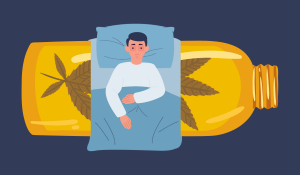Research shows that CBD has many proven medical benefits. Most recently, studies focus on the use of CBD for inflammation and, more specifically, hepatitis. The substance shows promising results for both managing conditions and slowing the progression of viral hepatitis.
Hepatitis B is a viral infection that causes inflammation of the liver. It is caused by the hepatitis B virus and can be either acute or chronic. When contracted in adulthood, the virus is typically acute and can last for a few weeks to a few months. Symptoms of acute hepatitis typically develop within six months of transmission. Chronic hepatitis B, on the other hand, develops when the body is unable to rid itself of the virus and is much more severe than acute HBV. Chronic HBV can cause serious health problems, such as liver damage, liver cancer, cirrhosis and even death. Though HPV can become chronic in anyone, persons most at risk are individuals who contract the virus early in life.
Hepatitis B is spread through person-to-person transmission and through semen, blood or other bodily fluids. It cannot be spread through sneezing or coughing. Rather, typical modes of transmission include sexual contact, needle sharing, accidental needle pokes and mother to child transmission.
Symptoms of hepatitis B don’t typically develop until weeks to months after contracting the virus, though some people show signs within two weeks of infection. Other individuals never present symptoms at all. That said, common signs of infection are as follows:
• Weakness and fatigue
• Fever
• Dark urine
• Abdominal pain
• Loss of appetite
• Nausea and vomiting
• Joint paint
• Jaundice
Symptoms can interfere with one’s daily activities and overall quality of life, which is why researchers are constantly on the lookout for ways to better manage them and treat the underlying issue.
For decades, researchers have been attempting to gauge the effectiveness of CBD on inflammation. One group of studies focused on the role of cannabinoid receptors on inflammation. A review of those studies concluded that the activation of CB2 receptors by cannabinoids, either in vivo or in vitro, helps to decrease the activation rate of inflammatory cells. More notable findings suggest that, in addition to reducing inflammation, CBD can help slow the progression of certain diseases, such as the HBV virus.

If you've ever wondered about using CBD for insomnia, you should know how CBD helps anxiety, stabilizes your sleep-wake cycle, and makes falling asleep easier.
Read More
Key Features Pros Cons Real User Experience Final Verdict: Is Five CBD Full-Spectrum CBD+THC Oil Worth It? Five CBD Full-Spectrum CBD+THC Oil delivers where it...
Read More
CBD-infused salad dressing: Imagine a fresh, crisp salad enhanced with a light, herbaceous vinaigrette containing your daily dose of CBD. To create this, you’ll need...
Read More
What are CBD beverages, exactly? They’re simply drinks infused with cannabidiol (CBD), a compound found in the hemp plant. Now, before you think “high,” to...
Read More
Importance of Quality Control in CBD Quality control is the backbone of a safe CBD product. Rigorous quality standards help ensure that products are consistent,...
Read More
Understanding the Grip of Anxiety: Recognizing the Signs Have you ever felt anxious before a big event? It’s a common experience. But when anxiety becomes...
Read More
CBD for Pets: A Pet Parent’s Guide to Dosage We all want the best for our pets, especially when they’re struggling with pain, anxiety, or...
Read More
1. What Is CBD and Why Is It a Game-Changer for Skin Health? CBD (cannabidiol) is a natural compound extracted from the hemp plant. Unlike...
Read More
Potential Health Benefits of CBD for Dogs and Cats Pain and Inflammation Relief CBD may alleviate pain and inflammation in pets with arthritis or joint...
Read More
Best CBD Gummies for Sleep and Relaxation: A Comprehensive Review Through extensive testing and analysis, they have discovered that the most effective options typically contain...
Read More